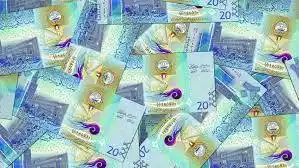 menu
menu
menu
menu

According to Forbes, the Kuwaiti dinar is the most valuable currency in the world, performing better than the US dollar, British pound, and euro.
The Kuwaiti dinar (KWD) is the national currency of Kuwait, a Middle Eastern country located in the Arabian Peninsula of the Persian Gulf.
Its name comes from the Roman denarius and is subdivided into 1000 fils, a coin used in many Arab countries.
How can you tell if a currency is valuable? You can tell by the quantity of goods and services that can be purchased with one unit of the country's currency and the amount of foreign currency that can be exchanged. For example, 1 KWD is $3 while ₦1,700 is $1.
The economy of Kuwait is centred on petroleum products; the oil sector provides 90% of the government's income.
Although Kuwait's economy is heavily reliant on oil, unlike many oil-rich nations, it is a stable country that makes good use of its oil earnings.
Furthermore, it exports a lot of oil. Due to the huge demand for oil around the world, there is also a large need for Kuwaiti money to be used to pay for it, which makes the KWD an extremely valuable currency.
The KWD benefits from this regulated exchange rate, which maintains its value steadily high as opposed to free-floating currencies, which can be more volatile.
Instead of being tied to a single currency, the KWD is tied to an array (basket) of currencies.
Kuwait's high oil wealth and small population contribute to its high per capita income, enhancing the currency's overall strength.
This wealth distribution guarantees that Kuwait's financial system will continue to be strong and that public resources will be less taxed.
Through the Kuwait Investment Authority (KIA), a sovereign wealth fund that oversees the country's oil earnings, the country has amassed considerable financial reserves.
These reserves ensure the strength of the currency by promoting economic stability and serving as a cushion against downturns in the economy.
Kuwait's central bank holds significant foreign currency reserves, mostly in US dollars, which ensures the stability of the Kuwaiti dinar. These reserves enable the government to defend the currency if needed, enhancing its global market strength.
Finally, the Kuwaiti dinar's position as the world's strongest currency can be attributed to its oil wealth, stable economy, low inflation, and great monetary policies.
Although the currency basket's composition is unknown, it is anticipated to be significantly weighted towards the US dollar.
Because of this controlled peg, the dinar is protected against changes in the world currency markets.

7 months ago
Sed ut perspiciatis unde omnis iste natus error sit voluptatem accusantium doloremque laudantium, totam rem aperiam.
Read more